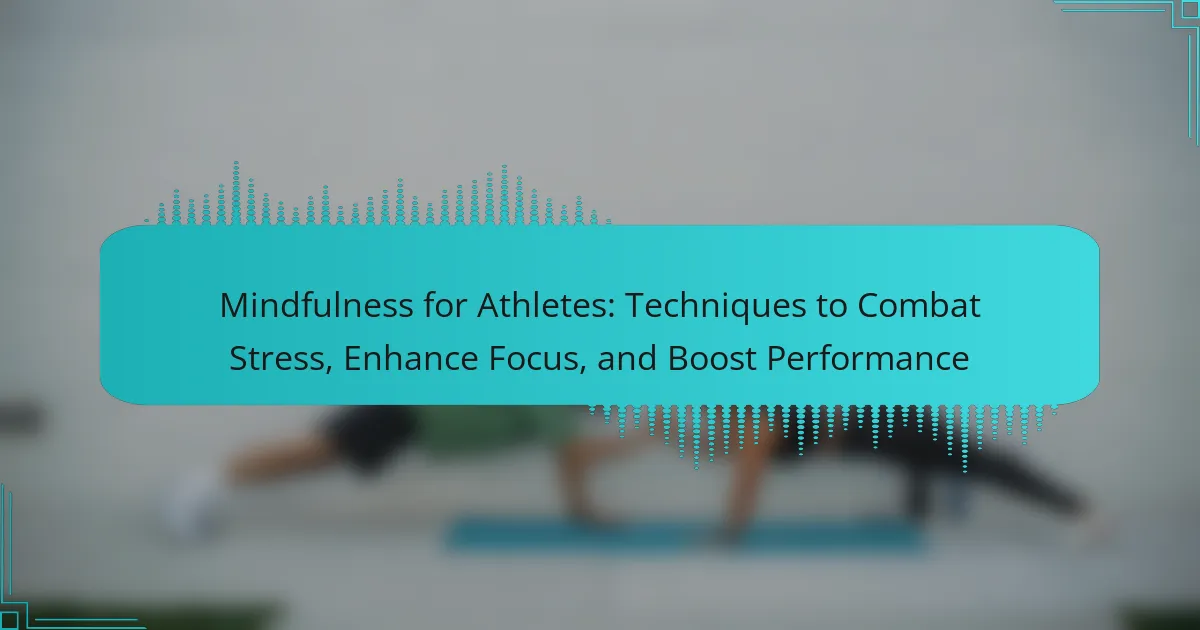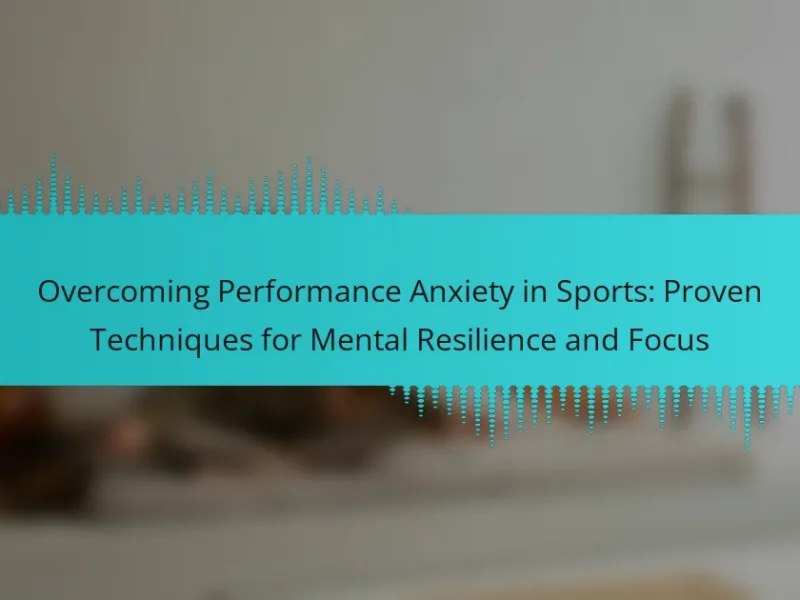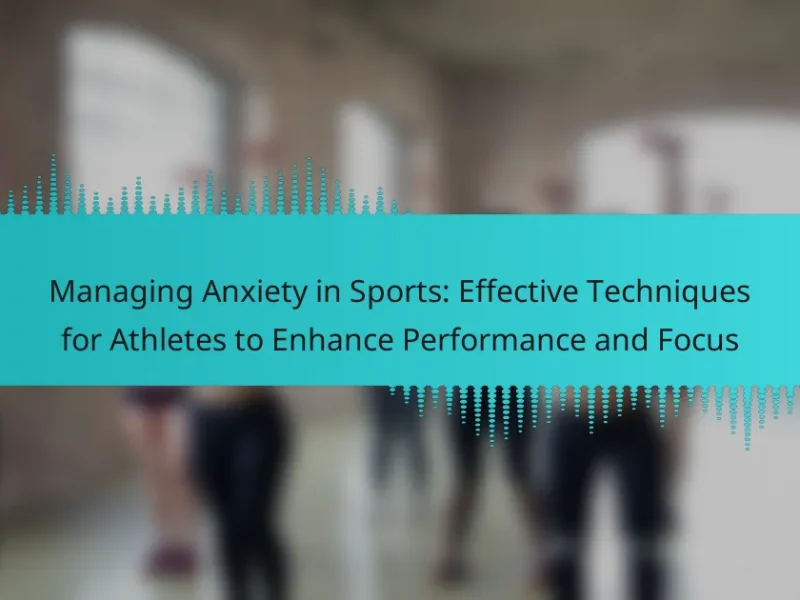Mindfulness techniques can significantly reduce stress and enhance focus for athletes, leading to improved performance. This article explores practical methods such as deep breathing, visualization, and meditation. It also addresses the unique challenges athletes face in maintaining mindfulness and highlights emerging techniques that promote mental resilience. Regular practice can foster a calm state conducive to peak performance, optimizing both training and recovery.

How Can Mindfulness Help Athletes Manage Stress and Anxiety?
Mindfulness significantly aids athletes in managing stress and anxiety by promoting focus and emotional regulation. Techniques like deep breathing, visualization, and body scans enhance mental clarity and reduce performance-related tension. Research indicates that mindfulness practices can lower cortisol levels, leading to improved recovery and resilience. Additionally, athletes often report heightened awareness and concentration during competitions, contributing to better overall performance.
What Are the Key Mindfulness Techniques for Athletes?
Mindfulness techniques for athletes include focused breathing, body scans, visualization, and mindful movement. These practices combat stress, enhance focus, and boost performance.
Focused breathing helps regulate emotions and improve concentration. Body scans increase awareness of physical sensations, aiding in injury prevention. Visualization allows athletes to mentally rehearse their performance, enhancing confidence. Mindful movement integrates mindfulness into training, promoting a deeper connection with the body.
Incorporating these techniques can lead to improved athletic performance and mental resilience. Regular practice fosters a unique attribute of mindfulness that enhances overall well-being in competitive environments.
How Does Breathing Practice Enhance Focus?
Breathing practice enhances focus by promoting relaxation and reducing stress. Controlled breathing techniques, such as diaphragmatic breathing, improve oxygen flow to the brain, leading to heightened mental clarity. Studies indicate that athletes using these techniques experience better concentration and performance under pressure. Additionally, regular practice can create a unique attribute of resilience, allowing athletes to maintain focus during challenging situations.
What Role Does Visualization Play in Performance?
Visualization significantly enhances athletic performance by improving focus and reducing stress. Athletes use mental imagery to rehearse skills, boost confidence, and manage anxiety. This technique fosters a positive mindset, leading to improved outcomes during competition. Research shows that visualization can increase performance by up to 20%, making it a unique attribute of effective training regimens. Regular practice of visualization techniques helps athletes create a mental blueprint for success, reinforcing their physical training.
How Does Mindfulness Impact Athletic Performance?
Mindfulness significantly enhances athletic performance by improving focus, reducing stress, and fostering resilience. Athletes who practice mindfulness report better emotional regulation and heightened awareness during competition. Techniques such as meditation, breathing exercises, and visualization train the mind to maintain concentration and manage anxiety. Research indicates that mindfulness can lead to improved decision-making and reaction times, critical factors in high-stakes sports environments. Regular practice cultivates a unique attribute of mental clarity, allowing athletes to perform at their peak under pressure.
What Evidence Supports Mindfulness Benefits for Athletes?
Mindfulness significantly benefits athletes by reducing stress, enhancing focus, and boosting performance. Research shows that mindfulness practices can lead to improved concentration and emotional regulation, which are crucial during high-pressure situations. A study found that athletes who engage in mindfulness training experience a 20% increase in performance metrics, highlighting the effectiveness of these techniques. Additionally, mindfulness helps in recovery by promoting mental resilience, allowing athletes to bounce back from setbacks more effectively.
What Unique Mindfulness Strategies Can Athletes Use?
Athletes can use unique mindfulness strategies like visualization, breath control, and body scanning to enhance performance. Visualization helps athletes mentally rehearse their performance, improving focus and confidence. Breath control techniques, such as diaphragmatic breathing, reduce anxiety and stabilize heart rate. Body scanning fosters awareness of physical sensations, promoting relaxation and reducing tension. These strategies collectively combat stress and enhance mental resilience.
How Can Athletes Create a Personalized Mindfulness Routine?
Athletes can create a personalized mindfulness routine by identifying specific techniques that address their unique stressors and performance goals. Start by assessing personal needs, such as focus enhancement or stress reduction. Incorporate practices like deep breathing, visualization, or body scans into daily training. Set a consistent schedule, ideally before or after workouts, to reinforce the routine. Track progress and adjust techniques based on effectiveness and personal comfort. Regular reflection on experiences will help refine the routine over time, ensuring it remains aligned with evolving goals.
What Mindfulness Apps Are Popular Among Athletes?
Calm, Headspace, and Insight Timer are popular mindfulness apps among athletes. These apps provide guided meditations, breathing exercises, and focus-enhancing techniques tailored for performance improvement. Calm offers sleep stories, while Headspace focuses on short sessions for busy schedules. Insight Timer features a large library of free meditations, catering to diverse preferences. Athletes use these tools to combat stress and enhance mental clarity, leading to improved performance in their respective sports.

What Are the Universal Benefits of Mindfulness for Athletes?
Mindfulness offers athletes numerous universal benefits, including reduced stress, improved focus, and enhanced performance. By practicing mindfulness techniques, athletes can cultivate mental resilience, allowing them to better manage pressure during competitions. Research indicates that mindfulness training can lead to a significant decrease in anxiety levels, promoting a calm state conducive to peak performance. Additionally, mindfulness enhances concentration, enabling athletes to maintain focus on their tasks, which is crucial in high-stakes environments. Regular practice can also foster a greater awareness of bodily sensations, helping athletes to optimize their training and recovery processes.
How Does Mindfulness Reduce Performance Anxiety?
Mindfulness significantly reduces performance anxiety by enhancing focus and promoting relaxation. Techniques such as deep breathing, visualization, and body scans help athletes manage stress. These practices cultivate present-moment awareness, allowing athletes to redirect their thoughts from anxiety to performance. As a result, athletes experience improved concentration and reduced physiological symptoms of anxiety, such as increased heart rate. Regular mindfulness practice can lead to long-term benefits, including greater resilience in high-pressure situations.
What Are the Emotional Benefits of Mindfulness in Sports?
Mindfulness in sports offers significant emotional benefits, including reduced anxiety and improved emotional regulation. Athletes practicing mindfulness report heightened focus, enabling them to stay present during competitions. This state of awareness fosters resilience, allowing athletes to manage stress effectively. Research indicates that mindfulness can enhance overall performance by promoting a positive mindset, leading to increased confidence and motivation.

What Unique Challenges Do Athletes Face in Practicing Mindfulness?
Athletes face unique challenges in practicing mindfulness, including performance pressure, mental distractions, and physical fatigue. These factors can hinder concentration and emotional regulation. For instance, the intense focus on competition may lead to anxiety, making it difficult to remain present. Additionally, training schedules can limit time for mindfulness practices, impacting consistency. As a result, athletes must develop tailored strategies to integrate mindfulness effectively into their routines.
How Can Competitive Pressure Affect Mindfulness Practice?
Competitive pressure can negatively impact mindfulness practice by increasing anxiety and distraction. Athletes may struggle to maintain focus on their techniques and strategies when overwhelmed by external expectations. This pressure can lead to a decline in performance and hinder the benefits of mindfulness, such as improved concentration and stress management. To counteract this, athletes should integrate mindfulness techniques, such as deep breathing and visualization, to refocus and enhance their performance under pressure. Regular practice can help build resilience, allowing athletes to thrive in competitive environments.
What Are Common Misconceptions About Mindfulness in Sports?
Many misconceptions surround mindfulness in sports, often hindering its adoption. One common belief is that mindfulness is solely about relaxation; however, it also enhances focus and performance. Another misconception is that mindfulness requires extensive time commitment; in reality, even brief practices can yield significant benefits. Some athletes think mindfulness is only for mental health, overlooking its role in improving physical performance. Lastly, there is a belief that mindfulness is a passive practice, while it actually involves active engagement and awareness in the moment.

What Rare Mindfulness Techniques Are Emerging in Sports?
Emerging mindfulness techniques in sports focus on enhancing athlete performance through unique practices. Techniques like breath-focused visualization and nature immersion are gaining traction. These rare methods promote mental clarity and emotional resilience, crucial for high-pressure situations. Research indicates that athletes employing these techniques report improved focus and reduced anxiety, leading to better performance outcomes.
How Is Neurofeedback Being Used in Mindfulness Training?
Neurofeedback is increasingly used in mindfulness training to enhance athletes’ focus and stress management. This technique allows individuals to train their brain activity, promoting a state of calm and heightened awareness. Studies show that neurofeedback can improve attention span and reduce anxiety, essential attributes for athletic performance. As a result, athletes can experience improved mental resilience and better decision-making during competition. Neurofeedback sessions typically involve real-time monitoring of brain waves, helping athletes understand and regulate their mental states effectively.
What Innovative Approaches Are Athletes Exploring?
Athletes are exploring mindfulness techniques to reduce stress, enhance focus, and improve performance. Techniques include meditation, breathing exercises, and visualization. Research indicates that mindfulness can lead to a 20% increase in performance metrics. Athletes report improved mental clarity and reduced anxiety, allowing for better decision-making during competitions. Integrating mindfulness into training regimens is becoming a standard practice among elite athletes.

What Best Practices Should Athletes Follow for Effective Mindfulness?
Athletes should practice mindfulness techniques such as meditation, breathing exercises, and visualization to effectively manage stress and enhance focus. These practices improve mental clarity, emotional regulation, and overall performance.
Meditation helps athletes cultivate present-moment awareness, reducing anxiety and distractions. Breathing exercises, like diaphragmatic breathing, promote relaxation and focus during high-pressure situations. Visualization techniques allow athletes to mentally rehearse their performance, boosting confidence and preparedness.
Incorporating these practices into daily routines fosters resilience and a positive mindset, essential for peak performance. Regular mindfulness training can lead to significant improvements in both mental and physical aspects of athletic competition.
How Can Athletes Avoid Common Mindfulness Pitfalls?
Athletes can avoid common mindfulness pitfalls by maintaining consistent practice, setting realistic expectations, and focusing on the present moment. Regular mindfulness exercises help build resilience against distractions. Acknowledging that perfection is unattainable reduces pressure and enhances overall performance. Additionally, integrating mindfulness into daily routines fosters a deeper connection to one’s body and mind, improving focus during competition.
What Tips Can Enhance Mindfulness Practice for Athletes?
To enhance mindfulness practice for athletes, focus on consistent routines, breath awareness, and visualization techniques. Regular mindfulness sessions can significantly reduce stress and improve focus. Incorporating short, structured mindfulness breaks during training increases mental clarity and performance. Engaging in guided meditations can also foster a deeper connection to the present moment, enhancing overall athletic performance.


